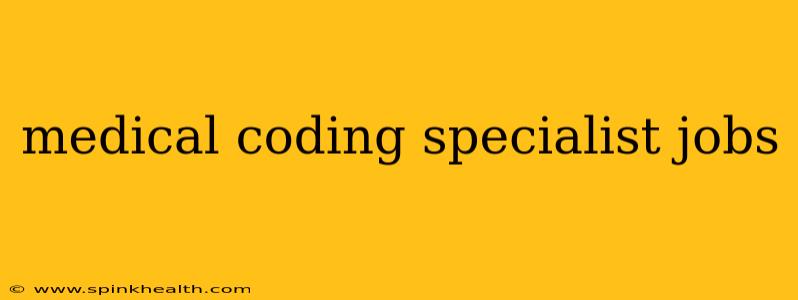Decoding the World of Medical Coding Specialist Jobs: A Career Deep Dive
The world of healthcare is complex, a vast network of treatments, procedures, and diagnoses. But behind the scenes, ensuring smooth billing and accurate record-keeping is a critical role: the medical coding specialist. This isn't just about numbers; it's about translating the language of medicine into the language of insurance, impacting patient care and healthcare finance. This article delves into the exciting reality of medical coding specialist jobs, answering common questions and exploring the rewarding career path this profession offers.
What Does a Medical Coding Specialist Do?
Imagine being the translator between doctors, hospitals, and insurance companies. That's essentially the job of a medical coding specialist. They take complex medical records – doctor's notes, lab results, diagnostic images – and convert them into standardized alphanumeric codes. These codes, based on systems like ICD-10 (International Classification of Diseases) and CPT (Current Procedural Terminology), are the language understood by insurance providers to process claims and reimbursements. Accuracy is paramount; a single incorrect code can delay or even deny payment, potentially impacting a patient's access to care.
My journey into medical coding started unexpectedly. After years in administration, I felt a pull towards something more meaningful. The meticulous nature of coding, the challenge of deciphering medical jargon, and the direct impact on patient care resonated deeply. The satisfaction of knowing my work directly contributes to the smooth functioning of the healthcare system is unparalleled.
What are the Different Types of Medical Coding Specialist Jobs?
The field offers diverse opportunities, catering to different preferences and skill sets. You might find yourself specializing in:
- Inpatient Coding: Focusing on hospital records, handling complex cases involving multiple diagnoses and procedures.
- Outpatient Coding: Dealing with physician office records, often involving simpler procedures and billing processes.
- Specialty Coding: Developing expertise in a specific medical field like cardiology, oncology, or orthopedics, requiring advanced knowledge of that area's terminology and procedures.
- Auditing: Reviewing coded records for accuracy and compliance, ensuring proper billing practices.
- Medical Billing and Coding: Some roles combine coding with billing, requiring a broader understanding of the entire revenue cycle.
What Skills Do I Need to Become a Medical Coding Specialist?
Becoming a successful medical coding specialist demands a unique blend of skills:
- Strong attention to detail: Accuracy is non-negotiable; a single misplaced digit can have significant consequences.
- Medical terminology knowledge: Understanding medical jargon is crucial for accurate coding.
- Analytical skills: The ability to decipher complex medical records and apply the correct codes is vital.
- Knowledge of coding systems (ICD-10, CPT, HCPCS): This is the foundation of the profession.
- Computer skills: Proficiency in coding software and electronic health records (EHR) is essential.
- Problem-solving abilities: You'll frequently encounter ambiguous or incomplete information, requiring creative problem-solving.
How Much Do Medical Coding Specialists Make?
Salary expectations vary based on experience, location, and specialization. Entry-level positions typically offer a competitive starting salary, with significant earning potential as experience and expertise grow. Specialized skills and certifications can further enhance earning capacity. Geographic location plays a role; higher-cost-of-living areas often reflect higher salaries.
What Education and Certification Do I Need for a Medical Coding Specialist Job?
While formal education isn't always mandatory, many employers prefer candidates with a certificate or associate degree in medical coding and billing. Professional certifications, like the Certified Professional Coder (CPC) credential offered by the American Academy of Professional Coders (AAPC), demonstrate competency and significantly enhance career prospects. Continuous learning is vital to stay updated with evolving coding systems and regulations.
What is the Job Outlook for Medical Coding Specialists?
The job outlook for medical coding specialists remains positive, driven by the ever-growing healthcare industry and the increasing reliance on electronic health records. The demand for skilled coders is expected to continue rising, offering stable employment opportunities for years to come.
Is a Medical Coding Specialist Job Right For Me?
If you possess a keen eye for detail, enjoy working with complex information, and are passionate about healthcare, a career as a medical coding specialist could be incredibly rewarding. It's a field that balances analytical thinking with the satisfaction of contributing directly to the smooth operation of the healthcare system. It's a career where accuracy translates into better patient care – a truly fulfilling aspect of the job.

